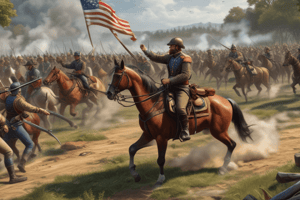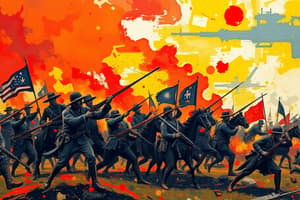Podcast
Questions and Answers
What was the result of the First Battle of Bull Run?
What was the result of the First Battle of Bull Run?
- Confederate Victory (correct)
- Unconditional Surrender
- Union Victory
- Stalemate
What promised to free enslaved people in rebellion states?
What promised to free enslaved people in rebellion states?
- Military Reconstruction Act
- Gettysburg Address
- Civil Rights Act
- Emancipation Proclamation (correct)
Which battle was known as 'The bloodiest day in Civil War history'?
Which battle was known as 'The bloodiest day in Civil War history'?
Battle of Antietam
The Battle of Gettysburg was a significant victory for the Confederacy.
The Battle of Gettysburg was a significant victory for the Confederacy.
Who led Sherman's March to the Sea?
Who led Sherman's March to the Sea?
What was the Anaconda Plan?
What was the Anaconda Plan?
Which event marked the sudden end of the Civil War?
Which event marked the sudden end of the Civil War?
What did Lincoln's Election of 1864 signify?
What did Lincoln's Election of 1864 signify?
The ___ Address was a speech given by Abraham Lincoln to capture the spirit of democracy.
The ___ Address was a speech given by Abraham Lincoln to capture the spirit of democracy.
Which statement is true about African American participation in the Civil War?
Which statement is true about African American participation in the Civil War?
Thomas 'Stonewall' Jackson died from wounds received at the Battle of Bull Run.
Thomas 'Stonewall' Jackson died from wounds received at the Battle of Bull Run.
Who was the head of the Union Army by the end of the Civil War?
Who was the head of the Union Army by the end of the Civil War?
What was the Confederate plan during the Civil War?
What was the Confederate plan during the Civil War?
What was the impact of border states during the Civil War?
What was the impact of border states during the Civil War?
What was the significance of the Battle of Vicksburg?
What was the significance of the Battle of Vicksburg?
What was the strategy of 'Total War' exemplified by Sherman?
What was the strategy of 'Total War' exemplified by Sherman?
Flashcards are hidden until you start studying
Study Notes
Turning Points of the Civil War
-
First Battle of Bull Run: Marked the realization that the war would not be brief; showcased the need for military training on both sides; resulted in a Confederate victory.
-
Battle of Antietam: Occurred on northern soil, aimed at gaining support for the Confederacy by provoking pro-Confederate sentiment in the North. It was the bloodiest single day in U.S. history with around 26,000 casualties; led to a Union victory and gave Lincoln the opportunity to announce the Emancipation Proclamation.
-
Emancipation Proclamation: Issued by Lincoln on September 22, 1862, it freed enslaved individuals in rebel states while excluding border states. It shifted the war's focus from solely preserving the Union to addressing slavery.
-
Battle of Chancellorsville: A tactical victory for Confederate General Robert E. Lee, despite facing a larger Union force. The battle resulted in over 18,000 Union casualties and the loss of Stonewall Jackson, whose death significantly impacted the Confederate leadership.
-
Battle of Gettysburg: A critical defeat for the Confederacy, as Lee's invasion of Pennsylvania ended with a Union victory, forcing Confederate troops to retreat to Virginia.
-
Battle of Vicksburg: A monumental Union victory under General Ulysses S. Grant, granting the North complete control of the Mississippi River and executing a key element of the Anaconda Plan.
-
Anaconda Plan: Proposed by Union General Winfield Scott, this three-part strategy aimed to blockade Confederate ports and control the Mississippi River to squeeze the South economically and militarily.
-
Sherman's March to the Sea: Led by General William Tecumseh Sherman, this campaign utilized total war tactics to destroy southern infrastructure and resources, notably capturing Atlanta and Savannah, which bolstered Northern morale.
-
Total War Strategy: Successfully employed by both Grant and Sherman, focusing on the complete destruction of the enemy's resources to hasten victory.
-
Election of 1864: A pivotal election between Lincoln and George McClellan, where Lincoln focused on reunification while McClellan aimed to end the war. Despite anti-war sentiment, Lincoln won reelection.
-
Appomattox Courthouse: Site of Robert E. Lee's surrender to Ulysses S. Grant, effectively ending the Civil War shortly before Lincoln was assassinated by John Wilkes Booth.
-
Gettysburg Address: Delivered by Lincoln, reaffirming the principles of liberty and democracy, addressing the nation’s moral imperatives in context of the Civil War.
-
Confederate Strategy: A defensive approach that aimed to capitalize on opportunities to attack the North, while seeking European aid based on cotton diplomacy.
-
Border States: States such as Missouri, Kentucky, Delaware, and Maryland that remained in the Union despite allowing slavery; their retention was crucial for Union resources and manufacturing capacity.
-
African American Participation: Early roles included support roles like cooks and grave diggers, evolving into combat roles as the war progressed, significantly influencing the Union’s manpower.
-
Southern Strategy: Emphasized defense of territory while leveraging cotton for foreign support; aimed to capture Washington D.C. to expedite the war’s conclusion.
-
Ulysses S. Grant: Became the head of the Union Army, leading crucial victories, including those at Vicksburg and ultimately achieving the surrender of Confederate forces at Appomattox.
-
George McClellan: The first commander of the Union Army, known for being overly cautious and was later dismissed by Lincoln.
-
Thomas "Stonewall" Jackson: A valiant Confederate commander known for his role at Bull Run; his death at Chancellorsville marked a significant blow to Confederate morale and tactics.
Studying That Suits You
Use AI to generate personalized quizzes and flashcards to suit your learning preferences.




